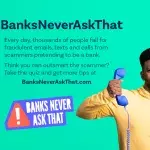Financial Protection

Ways to Safeguard your Personal Information: Review your monthly loan and checking account statements and online banking transactions…

We would like to make you aware of recent sophisticated scam schemes. Remember: Watertown Savings Bank employees will NEVER call, text, or email…

Any time can be a good time to identify new financial resolutions and goals you'd like to set for yourself. That mindset allows you to reevaluate…
So WHO is it that you are actually talking to...
We would like to make you aware of recent sophisticated scam schemes. Remember: Watertown Savings Bank employees will NEVER call, text, or email you to ask for your card number, PIN number, or any other personal information. If you think you…
Resolutions
Any time can be a good time to identify new financial resolutions and goals you'd like to set for yourself. That mindset allows you to reevaluate your financial well-being and make adjustments as needed. Make a budgetIdentify your fixed…
Keeping you Safe
At Watertown Savings Bank, we take your financial information and account security very seriously. We aim to provide you convenient tools, shredding events, and general fraud prevention tips to raise awareness of fraud schemes. If you think you may…
Know how to spot fraud schemes
Do you prefer boxers or briefs, do you believe in aliens, does pineapples belong on a pizza... Watertown Savings Bank would never ask you such random questions. We would also never ask for your SSN, account number, debit card number, to log into…
Can You Spot a Phishing Scam
Can You Spot a Phishing Scam Every day, thousands of people fall victim to fraudulent emails, texts and calls from scammers pretending to be their bank. In fact, the Federal Trade Commission’s report on fraud estimates that American consumers…
New Text Message Malware
New Text Message Malware We would like to make you aware of a new malware called FluBot that is spreading through text messages on mobile phones. The text message asks the recipient to click on a link to track a missing package. Once a person…
Top fraud schemes
We would like to caution our customers against common scams and fraud schemes. The following have been amongst the top 2020 scams that continue to be prevalent. Please be vigilant. Do not give away your personal and financial information by phone or…
Don't Fall Victim to Fraud
We have observed an increase in recent scams. We encourage everyone to be careful and vigilant so as to prevent financial loss, burden, heartache, and stress resulting from these fraud schemes. Oftentimes, you might not even know that you are…
Beware of New Scams
Beware of New Scams Safeguarding your personal and financial information is crucial to preventing fraud. We would like to make you aware of new scams—some related to COVID-19—that have recently affected our communities. The scammers have targeted…
FTC Tips to Avoid Coronavirus Scams
The Federal Trade Commission (FTC) continues its work to protect consumers and inform them of potential scams related to the coronavirus (COVID-19). We wanted to share with you the latest information to keep you and your personal information safe…
Have A Question ?
You're about to leave the Watertown Savings Bank website.
The Bank does not endorse or guarantee the products, information, or recommendations provided by linked sites and the Bank is not liable for any products or services advertised on these sites.
Each third party may have a privacy policy that differs from the Bank.
Any linked site may provide less security than the Bank's website.







